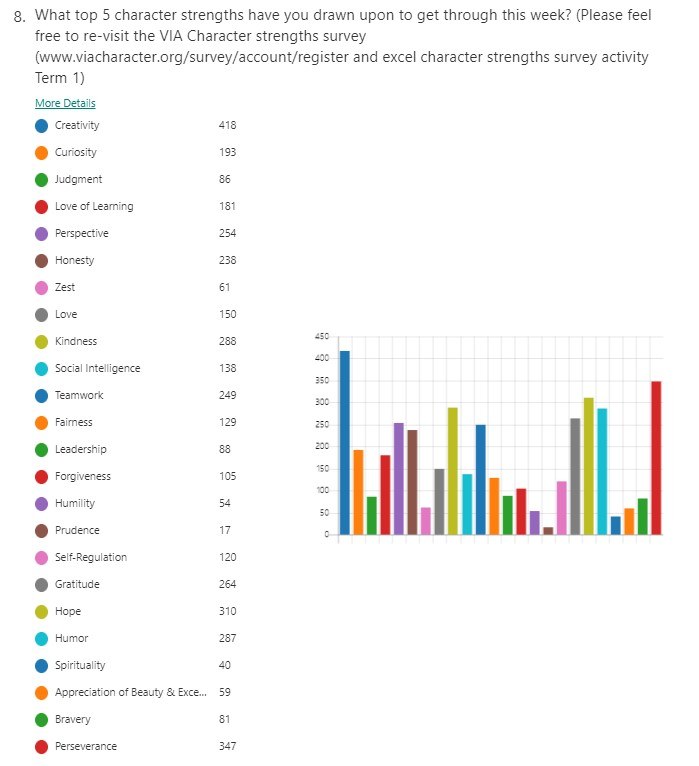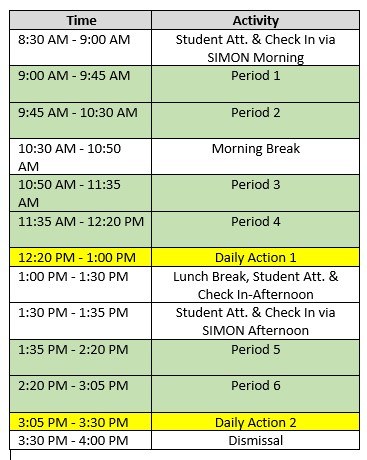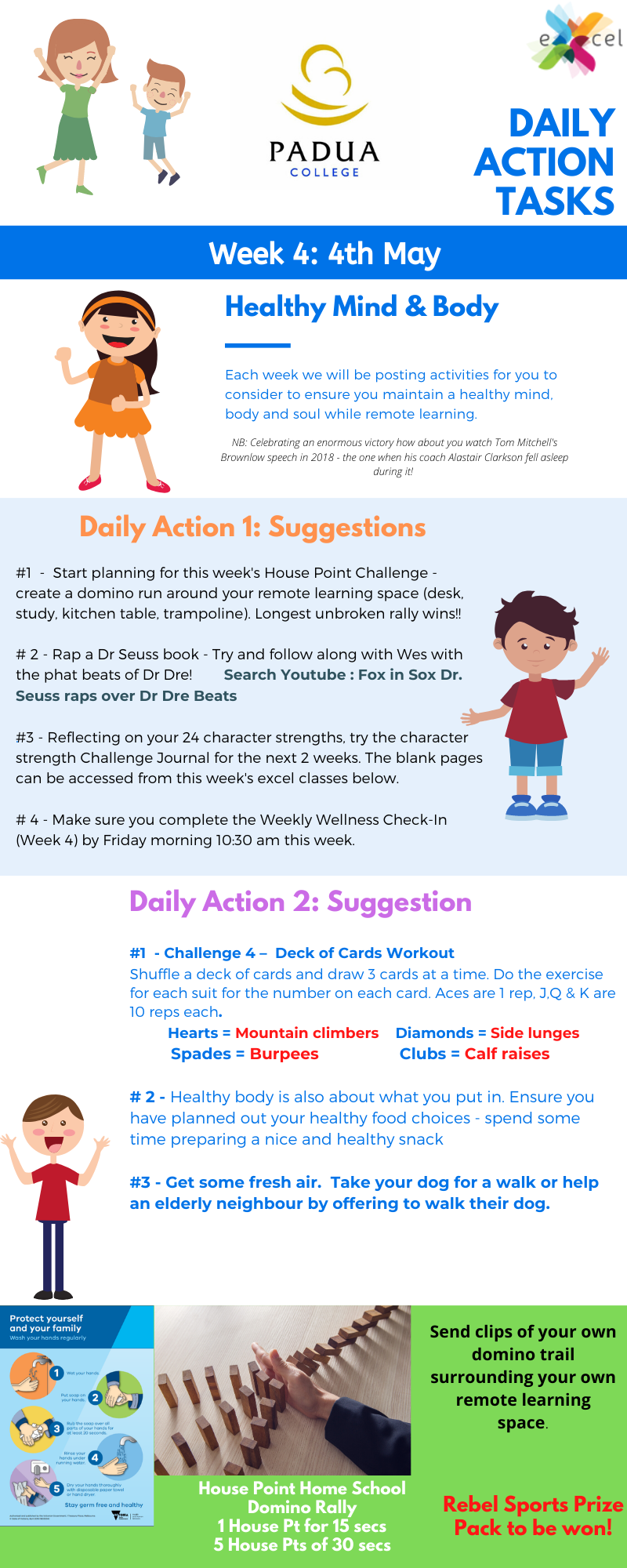Vice Principal's Report
Weekly Wellness Check-In
Each week we send out a Weekly Wellness Check-In to all our students while in this time of lockdown and remote learning. This is a weekly pastoral check-in opportunity to enable homeroom teachers and House Co-ordinators to see how our students have been coping with their remote learning. Students are expected to complete this check-in at the end of each week focussing on some of the challenges and opportunities this new environment has generated. The information will then be shared with homeroom teachers and House Co-ordinators who may follow up on responses if needed.
So far the House Co-ordinators have received their first set of student results with some great insights to how our students are coping in these uncertain times. I wish to share some of these (unidentified responses). One thing for certain is our students are really embracing the challenge of this remote delivery of education with optimism. Well done!



What are you grateful for this week?
(For authencity reasons, we have deliberatley not corrected student spelling!)
- Everything I have
- Comfortable chairs
- Being able to cook home meals for lunch is always good.
- parents that support me with what i love as well as school
- Having the ability too use my creativity for 3D Art
- being able to talk to my friends through facetime
- that my friend group has been facetiming each other everyday to check in on and catch up with one another
- the teachers putting in effort
- I am grateful that I can have lunch with my family
- i'm grateful for the education that we are getting even in the COVID-19 period.
- Good WiFi
- I am grateful that I am still able to technically go to school even through this tough time while others don't get this opportunity.
- my teachers help
- To work at home and still see my teachers as well as doing normal classwork.
- the school making sure we are doing ok.
- this week I'm grateful that I go to Padua.
- I'm grateful for turning 18 on Tuesday but I'm also very thankful for my family being very patient with me.
- My teachers opening google meets
- I am greatful for all the teachers that have put so much effort into doing all this work for us.
- My mum being able to stay home one day to help me and my mum spending last weekend helping me to catch up on my work I couldn’t do the week before
- I am grateful to still have access to education in these tough times.
- Teachers (X 10)
- Grateful for having a comfy place to sleep and a roof over my head
- I'm grateful for my teachers because they are doing awesome to teach us threw these tough times
- i am grateful for having the opotunitys to be able to have acses to remote learning
- Study periods to catch up on work
- Flexi on a Friday morning
- the new Micheal Jordan series on Netflix
- I am grateful for everything
Building Resilience
Setbacks, problems and failures are an inevitable part of life. As your teen matures and takes on more challenges, they will experience more frustrations and complications. Teaching your teen resilience – the ability to recover, adapt and keep going – will help them get excel in life, both personally and professionally.
Why is Resilience Important for Teenagers?
Navigating the tricky teen years can be tough. It’s a period of significant change, physically, mentally and experientially. Every week brings fresh opportunities and challenges which can present new problems to overcome. Helping your teen to develop resilience can equip them with the tools to reduce the impact that negative situations can have
What Does Resilience Look Like?
Teenagers who are resilient display the following traits, all of which can be learnt:
• Emotional awareness and the ability to regulate their emotions
• Control over their impulses
• An optimistic outlook
• Flexible and accurate thinking
• Empathy towards others
• Believe that they can achieve things (self-efficacy)
• A willingness to seek help when needed
Emotional Awareness and Ability to Regulate Emotions
For your teen to be resilient, they will need to become comfortable with their feelings and be able to express them appropriately. Help them to understand that they are in control of their emotions and thoughts, not the other way around. Here are some helpful tips:
• Naming without blaming – for instance, saying ‘I feel really frustrated’, but not blaming the emotion on someone or something – can lessen that emotion’s intensity.
• Pausing and focusing on a thought. Rushing is the enemy of resilience.
• Accepting that emotions aren’t good or bad – they just are.
Impulse control
We all have impulses to do and say things when we feel angry, annoyed or frustrated. This is normal and developing resilience doesn’t mean curbing their impulses. Instead, it’s about learning not to act on the unhelpful impulses. Try this four-step process with your teen:
• Stop and think – delay your response
• Deep breaths – it calms and gives control
• Before saying anything, think of three possible responses – choose the most constructive one
• Respond politely and respectfully – it gets you heard
Optimistic Mindset
Teach your teen optimism by getting them to think objectively about subjects like exams or their future, and to focus on the positives. Here are some helpful exercises:
• Learn to say, ‘I can’t do it … yet.’ The way we talk to ourselves affects us. If your teens tell themselves they can master something, chances are they will.
• Embrace challenges as a means of learning. They may stuff up this time, but they’ll learn how to do it better next time.
• Getting it done is what matters. Most tasks don’t require perfection, and that includes work and exams. So get your teen to focus on completion, rather than perfection.
• It isn’t about your teen seeing the world through rose-coloured glasses. Rather, it’s about them feeling confident that, whatever comes their way, they’ll be able to cope.
Flexible and Accurate Thinking
In a world where the landscape is continually shifting, flexible thinking will go a long way to helping your teen become more resilient. Being able to come up with a Plan B (or Plan C!) will relieve pressure on them when they’re considering what comes next.
Tips to help them think more flexibly and accurately include:
• Recognise that others may look at things differently. This encourages them to consider what others are looking for. A useful skill when applying for jobs or dealing with co-workers.
• Practical versus personal explanations – for example, did that person forget because they’re busy and stressed, rather than inconsiderate?
• Realise that it’s okay to feel uncertainty – feeling certain doesn’t guarantee you’re right.
Empathy Towards Others
Encouraging your teen to stand in someone else’s shoes to understand their emotions will help your teen develop empathy. Illustrate examples of understanding with your teen by asking them how they would feel in the following scenarios:
• A friend is being bullied.
• A friend’s pet dies.
• A friend fails an exam.
• A teammate loses the match for their side.
Self-efficacy
Self-efficacy is a person’s belief in their ability to succeed at something, and this can play a significant role in how your teen approaches achieving goals, performing tasks and overcoming challenges. You can help them to develop self-efficacy by asking:
1. What three things have you done in the past week that you did well?
2. How did these make you feel?
3. What three things have you completed in the past few months that other people have noticed?
4. How did these make you feel?
Willingness to Seek Help and Support
We all need help at times. Resilient people know when to ask for help and will reach out to others when they’re going through a tough time. You can encourage your teen to ask for support when they need it, and acknowledge and reward them when they do:
1. Assure your teen that seeking help is a sign of strength.
2. Keep an open dialogue with your teen, so it’s easier for them to bring things up.
3. Remind your teen of positive experiences when they or their friends got help in the past.
Be a Role Model for Resilience
Lead from the front and talk with your teen about your own experiences with knockbacks and failures, and how you were able to move on. It also doesn’t hurt to name drop a few famous faces that have bounced back from the bottom. From JK Rowling to Michael Jordan, some of the most successful people of all time, have dealt with rejection and failure to get back on top.
Daily Action Tasks
Students doing all of their classes online is very different to our normal learning in classrooms and other spaces at school. The main difference is that they are spending a lot more time in front of their computer screen, and far less time working with others and moving around the classroom for activities.
Therefore we have created times during the day when we will get you to do something different. These are your two ‘Daily Actions’, in the middle and at the end of the day.

Instead of screen focused learning, we will ask our students to spend some time doing more active or reflective actions to help them keep a healthy mind, body and soul.
Some of these activities are like their normal Excel lessons on Tuesday mornings. These activities have been created by staff at Padua and regularly posted on SIMON to complete. Below you will find this week’s version of Daily Action Tasks.


Sam Wright
Vice Principal – Students


